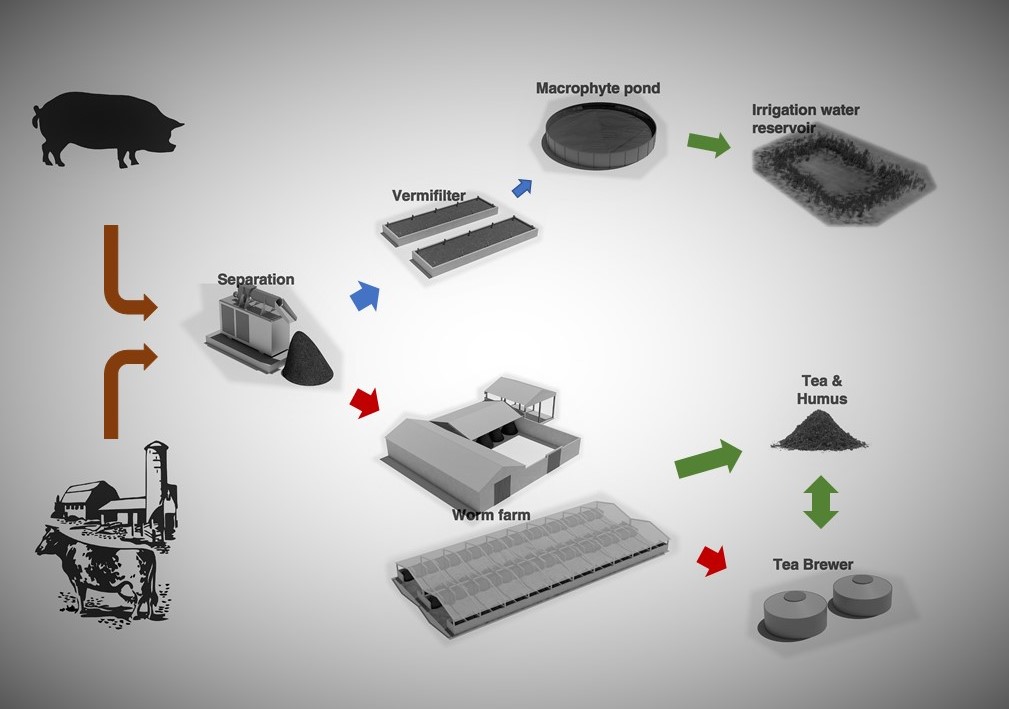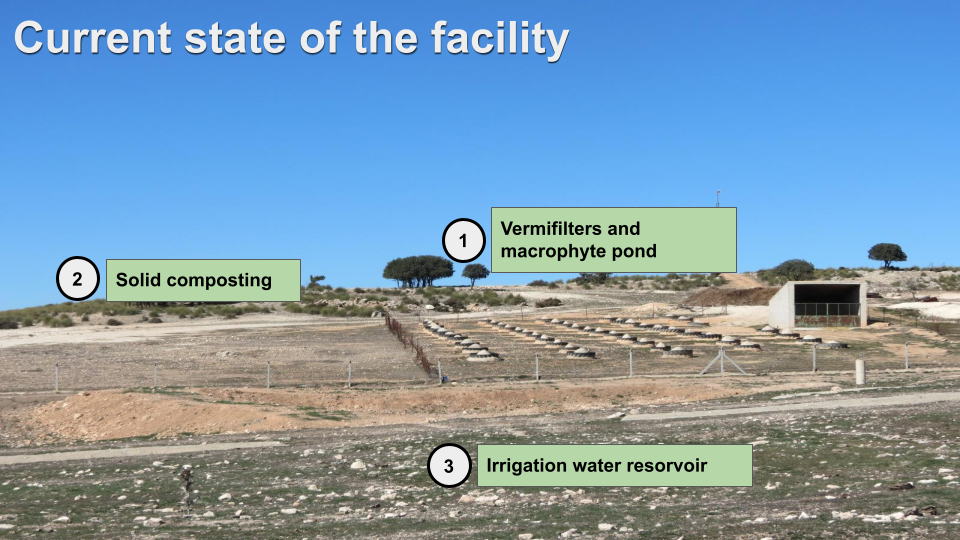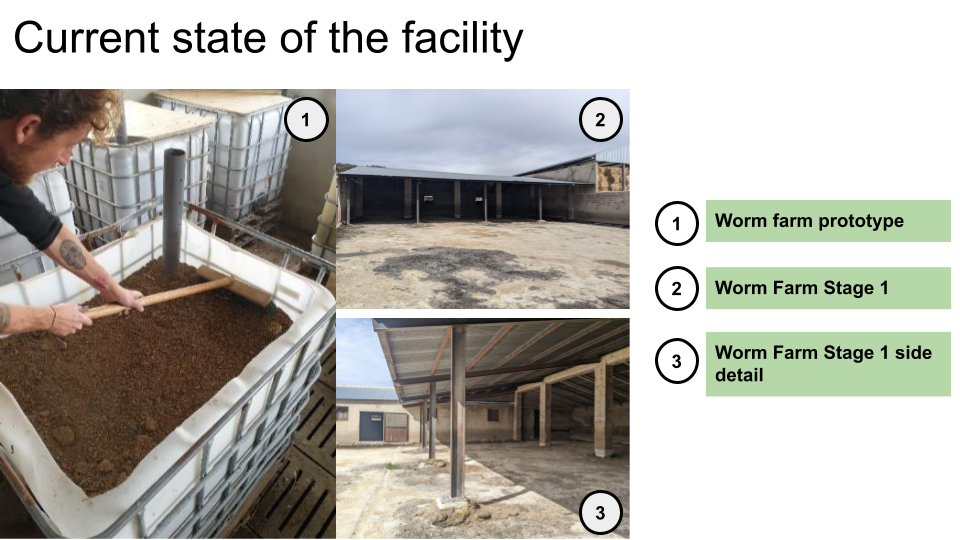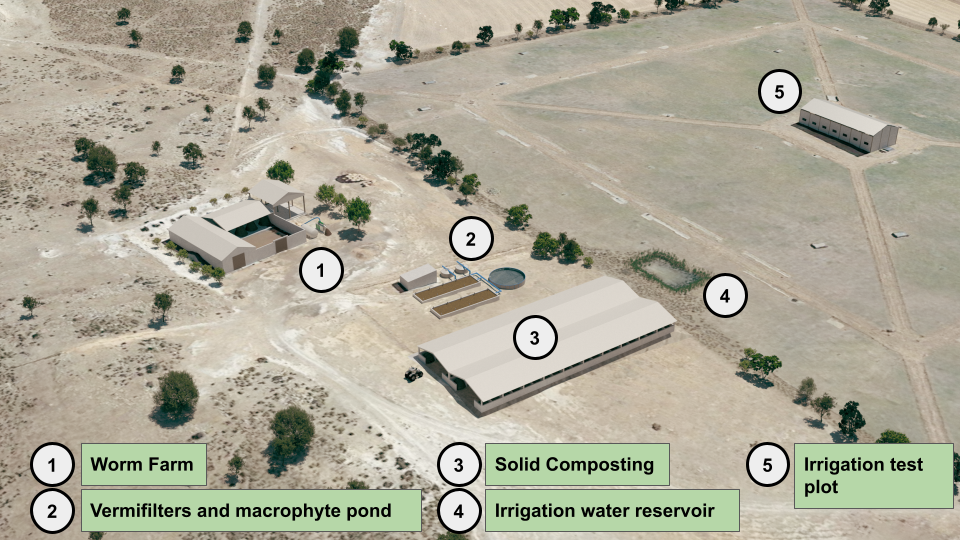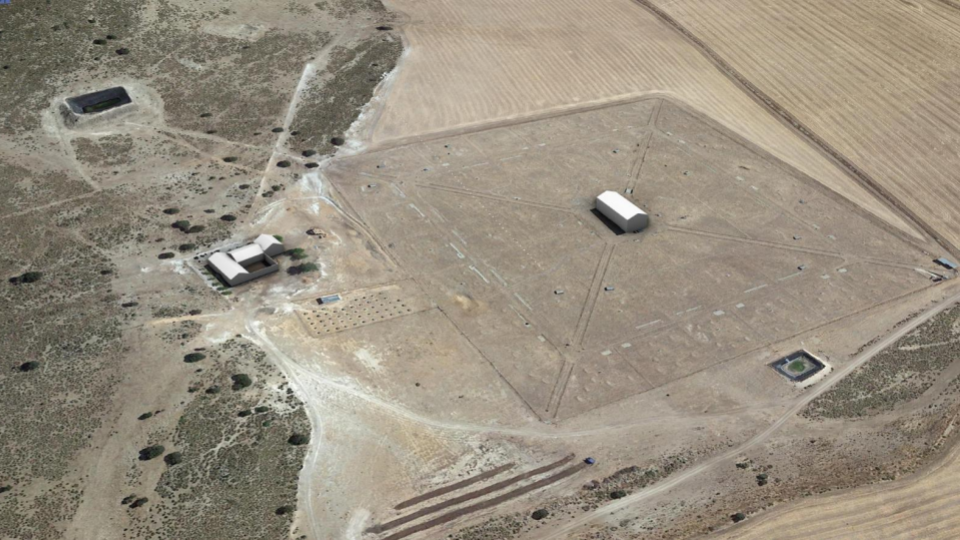Vermis
Basic information
Project Title
Full project title
Category
Project Description
Spain’s enormous pork industry keeps growing despite its deeply negative consequences. Our proposal arises from the agricultural side of this delicate situation: we want to transform pig farm waste into one of the best organic fertilisers possible.
Attacking the pollution problem in our area and rendering a natural organic fertiliser that nourishes and heals the soil, we aspire to promote a collaborative effort that shifts our impact on the environment from a harmful to a regenerative one.
Geographical Scope
Project Region
Urban or rural issues
Physical or other transformations
EU Programme or fund
Which funds
Description of the project
Summary
La Junquera farm is located in a rural, low populated area of the north-western region of Murcia, in the south of Spain.
Serious soil erosion, aquifer pollution and water scarcity, and biodiversity loss are the norm. Pig farms in the region are growing in numbers and we have decided to contribute by offering a solution that can help the region's economic growth without jeopardising the ecosystem, but improving it.
Our objective is to provide alternatives to solve these problems, building a healthier food production system and regenerating the land, while promoting social inclusion and community collaboration.
Starting in October 2021, we have been working on a plan to reuse abandoned infrastructure on the farm, creating a suitable place for the hidden protagonists of the project, worms, while reducing costs and environmental impact.
Our endeavour begins by establishing a nucleus of vermiculture, a technique based on utilising earthworms to convert organic waste into vermicompost, in the farm to start transforming our sheep, horse and cow manure, as well as the food waste from the village into a biofertilizer with high beneficial impacts to improve the soil health and fertility of the land.
Then, by the time the worm population reaches a suitable size, we will start treating the pig slurry from neighbouring farms. For this, we will need a slurry separator allowing us to treat the solid and liquid parts independently, making the process more efficient and reducing toxins and the emission of greenhouse gases.
We vermicompost the solids alongside the manure and organic waste from La Junquera, and treat the liquids (the most problematic part) by implementing a biofiltration system based on Dr. José Tohá Castellá's wastewater treatment.
Once completed, the farm will be able to collect and transform the whole amount of effluents from the neighbouring pig farms that will not pollute the soil anymore but will be transformed into worm humus, ´the black gold'.
Key objectives for sustainability
In a situation where intensive meat production floods the local fertiliser market with pig slurry, farmers have little choice but to opt for the use of an effluent that has proven to be expensive to transport, difficult to store properly, and hazardous in the long term (high methane, ammonia, and nitrous oxide emissions into the atmosphere, nitrate leaching into the soil and the ensuing contamination of surface water bodies and aquifers).
The cornerstone of our proposal is the transformation of dangerous waste into a rich, stable, and high value-added fertiliser, targeting and acting upon several environmental and social issues:
- Decreasing soil, water, and atmospheric pollution, while creating a more resilient and fertile landscape to sustain crops and biodiversity.
- Using local resources, keeping a zero km approach. Producing biofertilisers that initially, will benefit 1100 hectares of drylands.
- Promoting the economic diversification of farms and consequently providing a more attractive environment for young farmers and village inhabitants, preventing rural exodus.
Once this is accomplished, we aim to encourage conventional livestock producers to adopt measures resulting in cleaner effluents so the treatment becomes even more effective and the end product reaches an enhanced quality.
The greener they become, the better for them, and for us.
In addition, the worm composting facility is connected to a 10 hectares plot with an unused irrigation system where a local endangered breed of cow, the Murciana-Levantina, is being brought back from near-extinction.
Once the system is up and running, there will be at least ten million litres of irrigation water available every year, allowing us to implement both a pond for wildlife and an irrigation system so we can seed and water green pastures in the plot. This boosts the quality of life of these grazing cows and improves the biodiversity of the landscape where the operation takes place.
Key objectives for aesthetics and quality
The motives behind this project are not limited to the physico-chemical transformation of waste into humus, this is a means to an end. We intend to play an active role in the transformation of the site where the action takes place and restore the beauty and balance of nature while developing an economic activity.
We are working hand-to-hand with living organisms trying to improve the landscape, upholding that our way of life doesn't have to abuse the ecosystem.
Our efforts are focused on matching the needs and practices of two differentiated parties and cast a solution that satisfies them both and also pushes forward to an enriched ecosphere, from a dry semi-arid steppe that is virtually condemned to become a desert, to a resilient dry mediterranean plateau where native flora and fauna can thrive, including us.
We intend to reharmonize with our habitat and become active agents in the process, that’s why in the implementation of the worm farm and the whole facility we are including the plantation of local species of shrubs and trees, supported by the water that comes out of the biofilter system.
Joining forces for the reforestation plans carried out by La Junquera, where saplings for each new planting season can be pre-treated with humus tea for a better root development and nearby wildlife corridors can be assisted when needed with some extra water or food.
Besides, anyone would be inclined to assume that any “waste management plant” seems like an undesirable place to be, but another one of the advantages of biomanagement is that results in an odour-free operation, making it a friendly environment to work at or visit. Not to mention the eradication of bad smells from the fertilisation, never again will this stench impact the surrounding populations.
What we are really aiming for is an exemplary combined zone: a vermicomposting plant inside a regenerative farm, surrounded by trees, pastures and a body of water. Providing life for crops and nature.
Key objectives for inclusion
For this, we partner with the Regeneration Academy, which works with students from different universities and organises workshops for local schools promoting regenerative farming practices.
In 2022, we are hosting our first courses on vermi-composting for young and unemployed people with the goal of improving their skillset, capabilities and hence their employability.
The potential scalability of the project is big, we think leading by example and sharing the knowledge acquired during the process is key so more farmers can find a way towards sustainable and collaborative fertilisation of their lands in the unique context of the highlands in southern Spain, alongside helping others transform their wastes.
As a result, we will all have more resilient and fertile lands, while reducing the dependency on conventional agriculture practices, like plowing, which have a negative effect in the long run.
Our project has started with a very low investment, using recycled materials and adapting unoccupied infrastructure. It can be replicated easily from a small scale for domestic waste management to big industrial operations, depending mainly on the management of the worm population and the accessibility to organic waste to be composted.
The financial scalability of the project is justified by the thousands of small villages in Latin America and India, to set some examples, that have adopted vermicomposting as a low-cost solution for the management of waste, preventing health issues related to unsanitary disposal of human and animal waste.
Like recycling, vermicomposting is not new. The adoption and diffusion of this technique as a solution for the actual problems that rural Spain is suffering, like the impregnation of vast areas with terrible odours coming from the pig slurry, is what makes our proposal unique.
Lastly, the project includes the participation of neighbouring villages in an organic waste recovery plan to be used in the vermicomposting system.
Physical or other transformations
Innovative character
The implementation of a vermi-composting project in the region engaging neighbouring communities and businesses to work together towards the efficient transformation of local waste into a product with added economic and ecological value, aiming for a circular and local agro-industrial system is our short introduction.
We feel inspired to form part of a project where from all perspectives the involved parties end up winning. We want to ignite the sense of community and work together as a team, to provide an alternative that is sustainable for the future generations, makes our region a nicer place to live in and brings us together.
Sustainability is a broad term, excessively used as a marketing strategy. We strongly believe it happens between responsible and conscious human activities and nature's ability to recover, searching for an ecological balance.
What is more aesthetic than nature itself? Nature has taught us the way, with this project we are just trying to replicate and accelerate the natural processes that have been occurring in the soil for centuries, using it as a tool to regenerate the land.
For this, and after decades of depletion of the resources, we need to work together.
Education, collaboration and sense of community are part of our proposals for inclusion and scalability. We are team-workers, it's our best strategy to achieve our goals and expand the impact, trying to inspire others and sharing our knowledge.
Starting in La Junquera, will create new jobs in the farm and will help have a demonstration site, both to acquire knowledge of the adaptation of these systems to our region and as a place to bring people to learn, so the system can be adopted by other rural communities and farmers.
It's a known problem in Europe that rural areas suffer the most from depopulation due to less socio-economic opportunities. We are hoping that through these actions we can render a more attractive environment for future generations in these areas.

